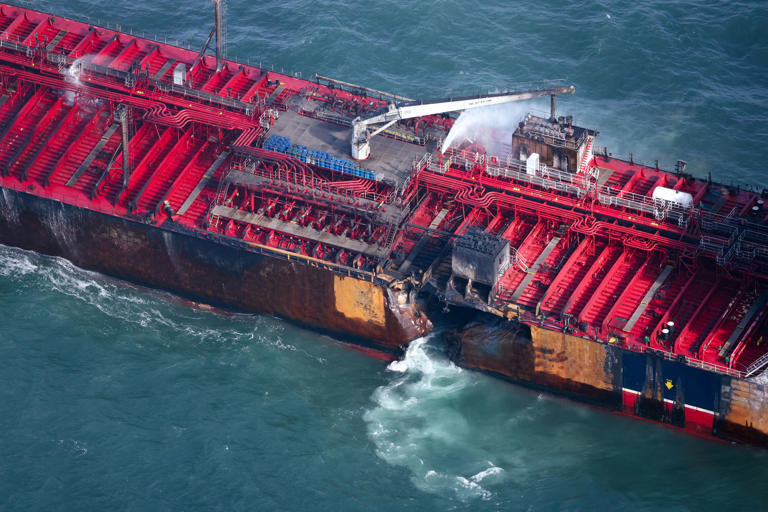
North Sea Ship Collision Sparks Fire and Environmental Emergency
Ashton RouthierShare
A major collision between an oil tanker and a cargo ship in the North Sea has raised fears of an environmental disaster after both vessels caught fire, spilling fuel into the water. The Stena Immaculate, a U.S.-registered tanker carrying 220,000 barrels of jet fuel, was struck by the Portuguese-flagged Solong on March 10, just off the coast of Hull. The impact caused a massive fire on both ships, sending plumes of black smoke into the air and triggering an emergency response.
While all crew members aboard the Stena Immaculate were safely evacuated, only 13 of the 14 sailors from the Solong were rescued. One crew member remains missing and is now presumed dead. The Solong, which initially became attached to the Stena Immaculate during the collision, broke free overnight and is now drifting, still ablaze, in the North Sea.
Concerns Over Toxic Leaks and Environmental Impact
Authorities and environmentalists are on high alert as investigations continue into whether the Solong was carrying hazardous materials. Early reports suggested the vessel may have been transporting sodium cyanide, a highly toxic chemical that could pose severe risks to marine life if released into the water. However, the ship’s owner, Ernst Russ, later denied these claims, stating that the vessel had no sodium cyanide containers onboard.
Despite this, marine conservationists warn that the fuel spill itself could have devastating effects. Jet fuel, while lighter than crude oil, can still harm marine ecosystems and wildlife. Additionally, both ships carried bunker fuel, a heavier and more persistent oil that can coat shorelines, smother marine habitats, and contaminate food chains.
The collision occurred near protected marine areas, including the Humber Estuary, home to breeding seabirds, grey seals, and migrating waterfowl. Conservation groups fear that a prolonged spill could impact thousands of birds and marine mammals, many of which rely on these waters for survival.
The STW Enviro Perspective: A Critical Need for Rapid Response
At STW Enviro, we recognize that immediate containment is essential in preventing long-term environmental damage. This incident underscores the critical importance of advanced spill response solutions, as quick action can mean the difference between a localized incident and a full-scale ecological disaster.
Our Pristine Sea oil spill response technology is designed to quickly contain and absorb spills, reducing the spread of contaminants and protecting fragile ecosystems. Had a rapid-response containment strategy been in place, much of the environmental damage could have been minimized.
Beyond spill mitigation, this collision highlights the need for stricter maritime safety regulations and better monitoring of hazardous cargo transport. Accidents like this demonstrate the vulnerabilities of global shipping routes and the necessity for improved oversight, emergency preparedness, and enforcement of safety protocols to prevent future incidents.
What Happens Next?
The UK government has launched a full-scale investigation into the collision, with maritime authorities closely monitoring the Solong as it continues to drift. Salvage teams are working to assess the stability of both vessels, while counter-pollution measures remain on standby until the fire on the Solong is fully extinguished.
British officials have pledged to work urgently to contain any further pollution and assess the scale of the environmental impact. As the situation unfolds, experts stress that preventative measures and stronger safety protocols are essential to avoiding similar disasters in the future.
At STW Enviro, we remain committed to advancing oil spill mitigation technologies and promoting best practices in maritime safety. As industries and governments work to manage the risks of oil transport, investing in effective spill response strategies and environmental safeguards will be crucial in protecting our oceans and coastal communities.